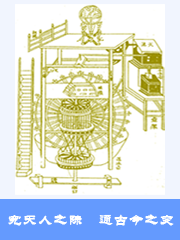- Studies in the History of Natural Science
- The Chinese Journal for the History of Science and Technology
- Science and Culture Review

- The Chinese Journal for the History of Science and technology NO.2 2005
The Chinese Journal for the History of Science and technology NO.2 2005
Cultural Manifold: A New Approach to Research on Ancient Science
(University of Pennsylvania, USA)
Abstract The recent book, The Way and the Word, demonstrates a new method of comparison that can improve our understanding of the past. It is even useful for studies that are not comparative. The purpose of this article is to explain and give some examples of its uses.
Key words Cultural manifold, Comparative Studies, Chinese Sciences, Greek Sciences
Postscript to Some Newly Discovered Historical Materials About the Contact Between Yang Zongjian and J.G.Andersson
CHEN Xingcan
(Institue of Archaeology, CASS, Beijing 100710, China)
Magnus FiskesjÖ
(Museum of Far Eastern ,Sweden)
Abstract Based on the newly discovered correspondence between Dr. J. G. Andersson (1874~1960), the director of the Museum of the Far Eastern Antiquities at Stockholm and Dr. Wong Wenhao (Weng Wenhao ,1889~1971,), the director of the Geological Survey of China, and Dr. Yang Zhongjian (C. C. Young, 1897~1979), a postgraduate student who studied paleontology then in Germany in late 1920s at MFEA, the authors discuss how Yang Zhongjian finished his Ph.D. dissertation on the basis of the Andersson collection from China which was then housed in Uppsala and prove that Yang Zhongjian’s Memoirs is quite reliable.
Kew words Yang Zhongjian, G. J. Andersson, Wong Wenhao, Chinese paleontology
Ch’en Tsai Hsin and His English Translation with Explanatory Notes of
Precious Mirror of the Four Elements
GUO Jinhai
(Institute for the History of Natural Science, CAS, Beijing 100010, China)
Abstract As a child Ch’en Tsai Hsin (1879-1945) studied at a mission any school, then went to Peking University. After graduating, his graduation he worked in the university. He studied in Columbia University from 1910. In 1912, he obtained his master’s degree of Art from Columbia University’s Teachers College by a thesis of history of Chinese mathematics, which is Szü Yüan Yü Chien of Chu Shih Chien, Bk. 1, Method of solving four problems.While studying at Teachers College, Columbia University, Ch’en Tsai Hsin was encouraged by Dr. David Eugene Smith(1860~1944), an historian of mathematics, to undertake the English translation and commentary of Precious Mirror of the Four Elements, which Ch’en began to do. He served as Chairman of the Department of Mathematics at Yenching University from 1920 to 1937. In addition to mathematics, Ch’en Tsai Hsin was concerned about the teaching and studying of history of Chinese mathematics very much during this period. According to original sources, this paper tries to restore Ch’en Tsai Hsin’s biography and historical events of his English translation and commentary of Precious Mirror of the Four Elements. Furthermore, the author hopes some facts of teaching and researching of history of Chinese mathematics in early modern China can be known.
Key words Ch’en Tsai Hsin, Precious Mirror of the Four Elements, translation and explanatory notes, Department of Mathematics at the Yenching University, historiography of Chinese mathematics
A Retrospect of and a Reflection on the Research on Mechanisms of Acupuncture Anesthesia:
HUANG Yanhong
(Center for Social Studies of Science, Peking University 100871, China)
Abstract Acupuncture anesthesia is a medical practice emerged in 1950s in China. The validity and physiological mechanisms of it was once an important field in medical circles in China. The interviewed academician of Chinese Academy of Sciences Professor Han Jisheng is one of the leading scientists who engaged themselves inthestudy of its mechanisms. Based on relevant literature, the interviewer designs the questions of oral history for the interview. According to these questions, the interviewed narrates how he himself turned into the field, describes the political, cultural and economic background of it, reviews gain and loss in different approaches, summarizes the reasons that their research results have been received by an international circle and left behind some regret, gives his opinions on integrated traditional and Western medicine, and indicates frankly the numetous difficulties in the researches on acupuncture anesthesia.
Key words acupuncture anesthesia; acupuncture analgesia, neurochemistry,integrated traditional and Western medicine, Han Jisheng



